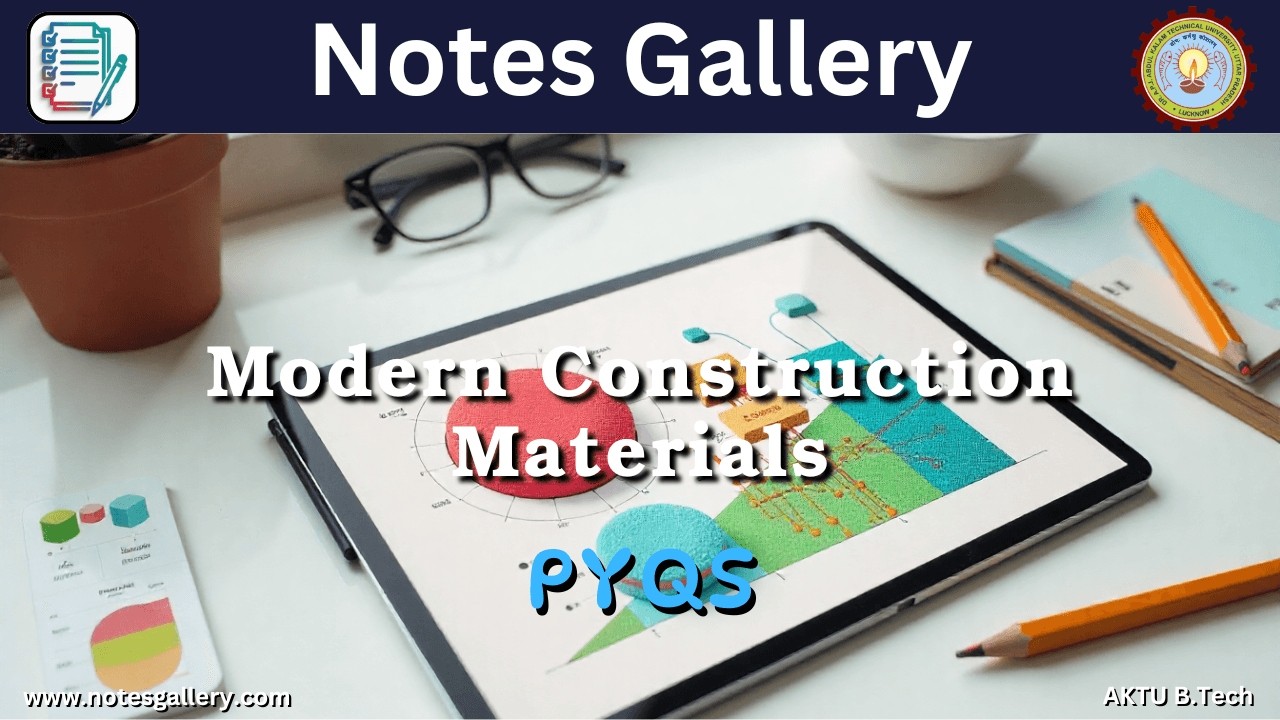Civil 3rd Year AKTU PYQS (Modern Construction Materials) is one of the most valuable resources for students preparing for construction-related subjects under AKTU. Modern Construction Materials introduces students to advanced materials used in the building industry, covering everything from smart materials to sustainable alternatives that shape today’s infrastructure. Because the subject blends innovation, science, and structural application, practicing PYQs becomes very important. Previous year questions help students understand which concepts matter the most and how AKTU frames exam questions.
| YEAR | LINKS |
|---|---|
| 2018-19 | DOWNLOAD |
| 2019-20 | NA |
| 2020-21 | NA |
| 2021-22 | NA |
| 2022-23 | DOWNLOAD |
| 2023-24 | DOWNLOAD |
| 2024-25 | DOWNLOAD |
| 2025-26 | coming soon… |
Click Links given below for notes/Imp. Question/PYQs
https://notesgallery.com/aktu-b-tech-1st-year-free-study-materials/ First Year
https://notesgallery.com/aktu-b-tech-2nd-year-free-study-materials/ Second Year
https://notesgallery.com/aktu-b-tech-3rd-year-free-study-materials/ Third Year
https://notesgallery.com/aktu-b-tech-4th-year-free-study-materials/ Fourth Year
Importance of Modern Construction Materials in Civil Engineering
Modern construction is no longer limited to traditional materials like cement, bricks, and steel. Civil engineers must understand composite materials, polymers, fibers, geosynthetics, smart materials, high-performance concrete, and eco-friendly alternatives. This is why solving Civil 3rd Year AKTU PYQS (Modern Construction Materials) helps students connect theory with practical engineering advancements. The subject improves both technical understanding and future industry readiness.
Why PYQs Are Necessary for Scoring Well
Students often struggle because the subject contains diverse emerging materials. But the good news is that AKTU follows a repeated pattern in long and short questions. Many units—such as fiber-reinforced concrete, polymer composites, sustainability materials, and admixtures—appear frequently every year. PYQs help you identify these patterns, revise concepts quickly, and practice explanation-type answers.
By reviewing Civil 3rd Year AKTU PYQS (Modern Construction Materials), students learn how to write crisp technical definitions, properties, advantages, and applications. Many questions also focus on comparisons, differences, and case-based usage of materials, which become easier once PYQs are practiced consistently.
Major Topics Repeated in PYQs
1. High-Performance Concrete (HPC)
Many questions revolve around the definition, composition, additives, and advantages of HPC. Students must understand how HPC differs from normal concrete and where it is used.
2. Fiber-Reinforced Concrete (FRC)
Properties of fibers, types of fibers, and their effects on crack resistance and tensile strength are frequently asked. PYQs usually include advantages and limitations of FRC.
3. Polymer-Based Construction Materials
Questions include polymer concrete, polymer-modified mortars, and polymer composites. Students are expected to write their characteristics, uses, and bonding behavior.
4. Geopolymers and Sustainable Construction
This section is gaining more weightage every year. Typical PYQs include geopolymer concrete, industrial waste-based materials like fly ash, and sustainability advantages.
5. Smart Construction Materials
Shape memory alloys, piezoelectric materials, self-healing concrete, and nano-materials are trending topics. These repeatedly appear in conceptual and application-based questions.
6. Geosynthetics and Their Applications
Geotextiles, geomembranes, geogrids, and geocomposites are often included in exams. PYQs mostly ask functions, types, and application areas.
7. Advanced Metals and Alloys
Materials like aluminum, stainless steel varieties, and corrosion-resistant alloys appear in short questions.
How PYQs Improve Exam Preparation
Solving Civil 3rd Year AKTU PYQS (Modern Construction Materials) helps students structure their answers clearly. This subject carries many explanation-based questions, and PYQs guide students on how much detail AKTU expects. PYQs also reduce revision time by highlighting high-weightage topics. Most questions revolve around definitions, characteristics, advantages, disadvantages, and real-life applications. Once students practice these, scoring well becomes easier.
Another major benefit is that PYQs help students understand the modern relevance of materials. The construction industry today demands engineers who know both traditional and advanced materials. Practicing these questions strengthens your technical foundation and helps in competitive exams too.
Exam-Focused Strategy for Modern Construction Materials
To maximize your score, start with repeatedly asked topics such as HPC, FRC, geopolymers, polymer composites, and geosynthetics. Prepare short notes for definitions and properties since these appear often in short-answer sections. For long questions, focus on applications, diagrams, and advantages.
Use Civil 3rd Year AKTU PYQS (Modern Construction Materials) to track patterns. Highlight terms like sustainability, durability, bonding strength, thermal resistance, and material behavior because they frequently occur in exam answers. Practice writing answers in points for clarity. Many students lose marks because they include unnecessary detail, but PYQs help refine what to include and what to avoid.
Why Notesgallery Helps AKTU Students
Students can easily access well-organized, exam-oriented PYQs on www.notesgallery.com, making preparation faster and more structured. Whether you’re revising before exams or preparing full notes, having past year questions ensures that you never miss out on important topics.
Conclusion
Modern Construction Materials is a diverse yet scoring subject if approached correctly. PYQs help students recognize repeated topics, learn technical language, and understand exam expectations. Solving Civil 3rd Year AKTU PYQS (Modern Construction Materials) boosts conceptual clarity and ensures strong preparation for the AKTU exam. With focused revision and consistent practice, students can confidently score high.
